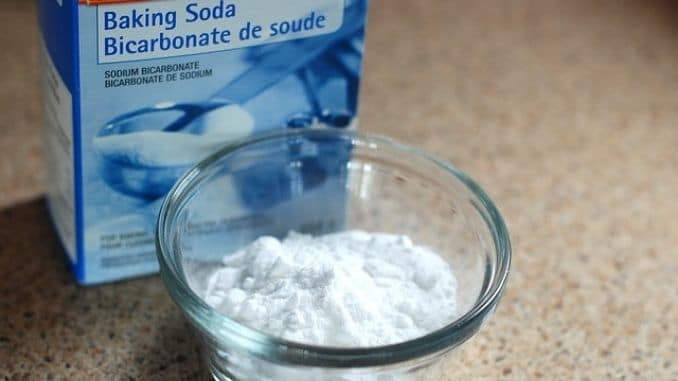
Jeff had to get to his afternoon meeting, but he wasn’t feeling good. He’d stuffed his lunch down in a hurry because he had to make a phone call, and then the rest of his lunch hour was lost when a coworker came in with a crisis. Now, he had this meeting, and his stomach was off. He searched his desk drawer for an antacid but came up empty.
He packed up his papers and headed down the hall, dropping by the company cafeteria on the way. Popping his head over the counter, he asked the cook if she had anything for indigestion. She ducked into her cupboards and emerged with a box of baking soda and a glass of water. Jeff stared, then shook his head. “No, my stomach’s upset.”
The cook nodded. “Mix a little bit into the water and drink it. You’ll feel better soon.”
Baking soda for indigestion? Does it work? Are there other home remedies for this common type of stomach upset?
What Is Indigestion?
We tend to use indigestion as a catchall term for any sort of stomach problem, but it’s a bit more specific than that. Also called dyspepsia, it refers to discomfort or pain in the upper abdomen. It’s not a disease in itself, but rather a symptom of something else that’s gone wrong.
How one person experiences indigestion can be very different from how another experiences it. Although both will note a problem in the upper abdomen, one person may feel a sense of uncomfortable fullness after eating while another may have a burning sensation or feel as although he may vomit. The symptoms may appear only occasionally or on a more frequent basis.
Heartburn can appear alongside indigestion, but the two conditions are separate. Heartburn is a more direct burning or pain in the center of the chest near the heart that can radiate into the neck or back and usually always occurs after eating.
Indigestion, on the other hand, is more of a vague feeling of discomfort and fullness. Other symptoms of indigestion may include:
- Nausea
- Abdominal bloating
- Feeling full after eating only a small amount
- Sometimes, belching and gas
- Acidic taste in the mouth
- Stomach growling
What Causes Indigestion?
There are a number of things that can cause indigestion. Eating too fast is one of the most common ones. When we eat quickly, we don’t give the brain time enough to register fullness, which means it’s easy to overeat. We take in excess air too, making the stomach feel larger than it is and contributing to ballooning and bloating.
We can reduce the risk of indigestion by taking our time with meals. In some cases, however, that may not be enough, as there are other things that can cause indigestion too.
- Eating high-fat or spicy foods
- Eating while stressed
- Consuming too many carbonated beverages
- Ulcers
- Gastroesophageal reflux disease (GERD)
- Irritable bowel syndrome
- Thyroid disease
- Pregnancy
- Some medications, like certain antibiotics, oral contraceptives, aspirin, and other painkillers and steroid medications
- Gallstones
- Stomach cancer (rare)
Mild indigestion that occurs occasionally is very common and does not indicate anything serious. Indigestion that lasts for more than two weeks, however, may signal another problem, particularly if it accompanies unintentional weight loss, fatigue, and weakness, repeated vomiting or trouble swallowing.
Lifestyle Changes That Help Eliminate Indigestion
When struggling with indigestion, the first thing you should do is take a closer look at your lifestyle. How much are you eating and when? How do you feel, emotionally, when eating? What foods are you eating?
Take a week to keep a diary in which you record all these details and see what you find. Meanwhile, consider these tips to help your stomach feel more comfortable:
- Take your time: This is one of the best things you can do to avoid indigestion. Give yourself a half-hour for each meal. Sit at a table and relax and allow yourself the break.
- Chew carefully: Inhaling your meal, so to speak, leads to stomach discomfort. Instead, take the time to chew each bite carefully. Digestion starts in the mouth, where saliva begins breaking down food.
- Avoid large meals: It’s better to eat smaller meals than to stuff everything down at once, overloading your stomach. Try five or six small meals a day rather than three big ones.
- Avoid certain foods: If you know that your stomach doesn’t take too kindly to high-fat foods, fried foods, spicy foods or other options, steer clear of these. It’s best to choose healthier items.
- Reduce intake of carbonated beverages: These can trigger indigestion and burping, so drink less.
- Control stress: Stress eating is one of the main causes of indigestion. Try writing down what you’re worried about before you start eating, and then let it go and enjoy your meal.
- Exercise regularly: It helps you control your weight and promotes better digestion. Wait an hour or two after eating, however, before exercising, to give your stomach a chance to complete digestion.
- Cut back on pain relievers: If you’re taking quite a few over-the-counter pain relievers, talk to your doctor about other options. Aspirin, ibuprofen and other anti-inflammatory drugs can irritate the stomach lining. If you still need to take them, always take them with food.
7 Natural Treatments for Indigestion
If the lifestyle tips above don’t help, or if you’re stuck one day having to eat on the run, try these natural treatments for indigestion.
1. Ginger
Ginger is a good all-around remedy for any type of stomach discomfort. In a 2011 study, researchers found that ginger stimulated gastric emptying in patients with dyspepsia, meaning it helped the food leave the stomach more quickly.
Ginger has long been used as a remedy for nausea, upset stomach, and vomiting. It’s even safe for pregnancy-related nausea like morning sickness. It has a direct effect on the stomach and may help you feel better. Try ginger tea or ginger capsules.
2. Peppermint and Caraway
Peppermint has a natural antispasmodic effect on the stomach, providing a soothing and comforting action. One study found that a combination of peppermint oil and caraway oil worked just as well as a heartburn medication in treating indigestion, relieving pain and frequency of stomach upset. Another study also found that peppermint helped reduce symptoms of upset stomach, with 60 to 95 percent of patients reporting improvement. Try peppermint in capsules or drink some peppermint tea after eating.
3. Chamomile
If you suspect stress eating may have caused your indigestion, chamomile can help. It’s known to be a relaxing herb in general, and it also works as a muscle relaxant and anti-inflammatory. That means it can calm an upset stomach and may reduce excess acid.
In a 2004 study, researchers reported that a supplement containing both peppermint and chamomile was more effective than a placebo at treating the symptoms of indigestion.
4. Artichoke Leaf Extract
Studies have found that this extract could help relieve the symptoms of dyspepsia. In 2002, researchers reported that after two months of treatment with a standardized artichoke leaf extract, patients with dyspepsia experienced an average of 40 percent reduction in symptoms, and also enjoyed a higher quality of life.
In a later study, researchers combined ginger and artichoke into a supplement and compared it with placebo in patients with dyspepsia. After 14 days of treatment, only the supplement group showed improvement — the placebo group did not. Subjects experienced reduced nausea, fullness, pain and bloating.
5. Fennel
Fennel seeds are a common cooking spice, particularly for fish dishes. Several cultures also chew them after meals to prevent gas and stomach upset and to treat bloating and abdominal pain. The seeds have various oil compounds that remove gas from the intestine and stimulate the digestive process. They also have antispasmodic properties, helping to relax smooth muscle cells lining the digestive tract.
Try chewing on about a teaspoon of fennel seeds for a few minutes after a meal, then swallow. The chewing experience is important, so don’t rush it. You can also brew up some fennel tea.
6. Licorice Root
This root is used to sweeten candies and beverages, but it can also soothe digestive upset. It has anti-inflammatory and immune-boosting properties that prevent toxic bacteria, like that which causes ulcers, from growing in the gut and that may help repair damage in the stomach lining.
In a 2012 study, researchers tried licorice root extract in patients with dyspepsia. They gave some subjects the extract, and others a placebo, for 30 days. Those taking the extract reported a significant decrease in symptoms after just 15 days, and again at 30 days. Specifically, the extract improved upper abdominal fullness and pain, bloating, early fullness, belching, and nausea.
7. Baking Soda
Baking soda is a natural antacid, so if you think excess stomach acid is causing your discomfort, mix one-quarter to one-half teaspoon of baking soda, depending on your weight and height, in about 4 ounces of water. Drink it slowly, as if you consume it too quickly, it could cause more gas. If it doesn’t work, it likely means your indigestion is caused by something else other than excess acid.
This remedy works only occasionally, however, and should not be something you rely on for any length of time. Avoid using baking soda with other medications as it can slow the rate of absorption. Long-term use may cause a rebound effect, making your symptoms worse than before. Do not use more than 3.5 teaspoons a day ― 1.5 if you’re age 60 or older ― and don’t use baking soda at all if you’ve been diagnosed with GERD.
For your guide to improving your digestion, check out our 14-Day Digestive Health Quick Start Program, here!








